Articles
Their work has been recognised through the Royal Academy of Engineering Africa Prize, which has earmarked 16 inventors who will get six months of mentoring and training. Eventually, one winner will be awarded £25,000. Here, we’ve picked out five exciting mechanical engineering innovations highlighted by the prize.
Testing for malaria without drawing blood
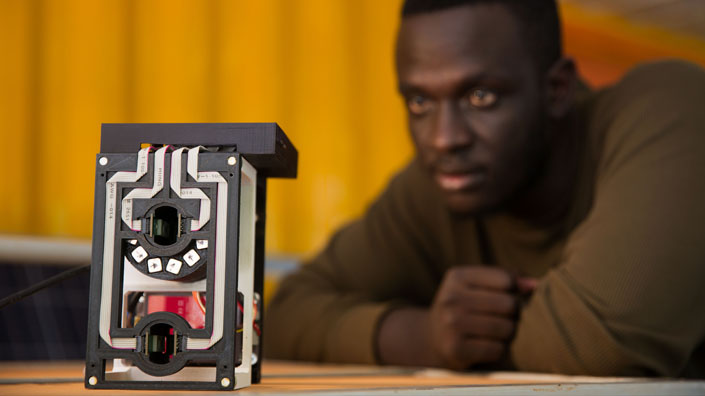 Brian Gitta and his classmates in Uganda kept missing their lectures – and not due to the usual students' excuses of hangovers and missed buses. They kept getting malaria. The disease kills more than 400,000 people a year, 90% of them in sub-Saharan Africa.
Brian Gitta and his classmates in Uganda kept missing their lectures – and not due to the usual students' excuses of hangovers and missed buses. They kept getting malaria. The disease kills more than 400,000 people a year, 90% of them in sub-Saharan Africa.
Gitta decided to do something about it. “Malaria tests involve too much pain. We engineered Matibabu, a simple, quick test to improve the health of our communities,” he said.
The device, which takes its name from the Swahili for ‘medical centre’ is a low-cost and reusable alternative to blood tests. It attaches to a patient’s finger, and shines a red beam of light through it to detect changes in the shape, colour and concentration of red blood cells – which are affected by malaria. The results can be sent to a mobile phone within a minute.
Keeping produce cool with solar power
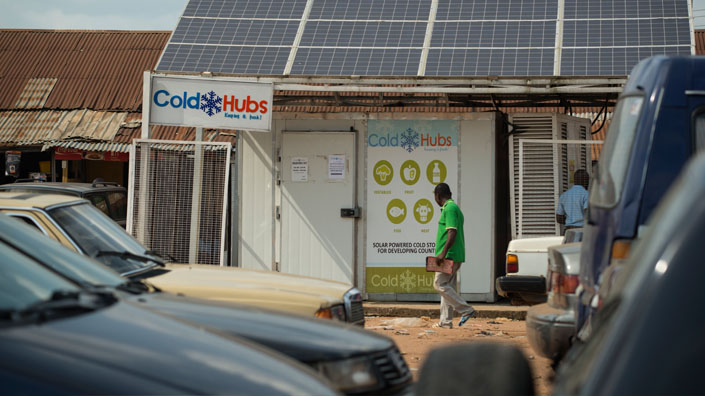 In Nigeria, as much as 45% of food is lost due to a lack of cold storage, according to the Rockefeller Foundation, which means a 25% loss of annual income for local farmers. Nnaemeka Chidiebere Ikegwuono’s solar-powered fridges are aimed at solving that problem. ColdHubs are 3m by 3m boxes with solar panels on the roof, which can store three tonnes of food in 30kg crates, using natural refrigerants to keep them cool.
In Nigeria, as much as 45% of food is lost due to a lack of cold storage, according to the Rockefeller Foundation, which means a 25% loss of annual income for local farmers. Nnaemeka Chidiebere Ikegwuono’s solar-powered fridges are aimed at solving that problem. ColdHubs are 3m by 3m boxes with solar panels on the roof, which can store three tonnes of food in 30kg crates, using natural refrigerants to keep them cool.
Excess solar power is stored in batteries to make sure the food stays cool at night. Farmers can rent space in the ColdHubs, which are being installed at markets and at farm co-operatives. There are five installed already across Nigeria, with 287 customers using them. “Our solar-powered ColdHubs ensure that fresh food is always available, the profits of farmers and traders increase, and food waste decreases,” said Ikegwuono.
Dolphin-inspired technology helping the blind to ‘see’
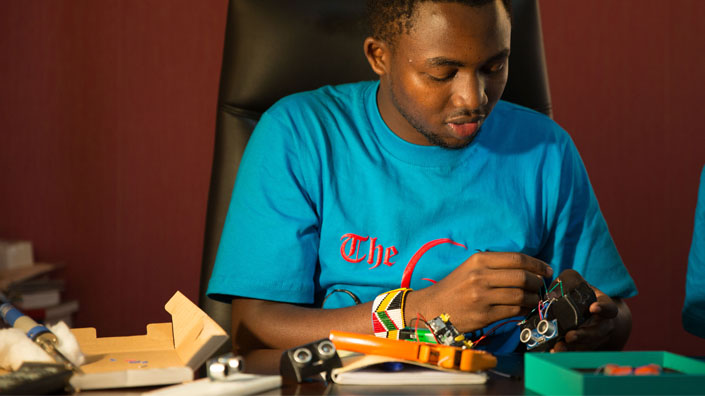 “The Sixth Sense, inspired by bats and dolphins, will transform the lives of visually impaired people by giving them more independence,” said Brian Mwiti Mwenda, who saw the challenges facing blind students at his school in Kenya and was inspired to try to make their lives easier.
“The Sixth Sense, inspired by bats and dolphins, will transform the lives of visually impaired people by giving them more independence,” said Brian Mwiti Mwenda, who saw the challenges facing blind students at his school in Kenya and was inspired to try to make their lives easier.
He created a small, handheld device that uses ultrasonic sensors to mimic the echolocation used by animals such as bats and dolphins, which he’s now testing with members from the Kenya Institute for the Blind. The device vibrates to warn the user when they’re close to an object, with the frequency of the vibration increasing as they approach it. There’s also a distress button, which can send a text with the person’s location to a preset contact.
Phone charger that doesn’t need a plug
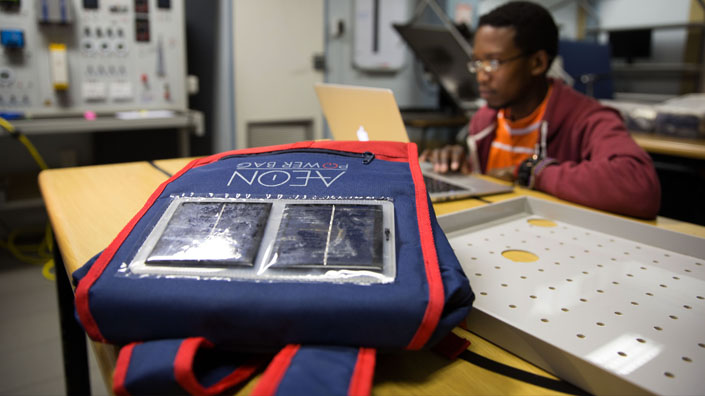 Although Africa’s internet and mobile communications are developing fast, there are still some areas where reliable electricity is hard to come by. Shalton Mphodisa Mothwa’s AEON Power Bag offers a potential solution. It’s a lightweight backpack with a unit that can harvest radio waves and convert them into power, as well as solar panels and inductive charging capabilities. It can charge up in 90 minutes in optimum conditions, and there’s a battery pack which can then be used to charge phones or other devices. Mothwa, who is from South Africa, said the device could make the lives of people with limited access to electricity “much easier”.
Although Africa’s internet and mobile communications are developing fast, there are still some areas where reliable electricity is hard to come by. Shalton Mphodisa Mothwa’s AEON Power Bag offers a potential solution. It’s a lightweight backpack with a unit that can harvest radio waves and convert them into power, as well as solar panels and inductive charging capabilities. It can charge up in 90 minutes in optimum conditions, and there’s a battery pack which can then be used to charge phones or other devices. Mothwa, who is from South Africa, said the device could make the lives of people with limited access to electricity “much easier”.
Preserving food with a ‘filing cabinet’
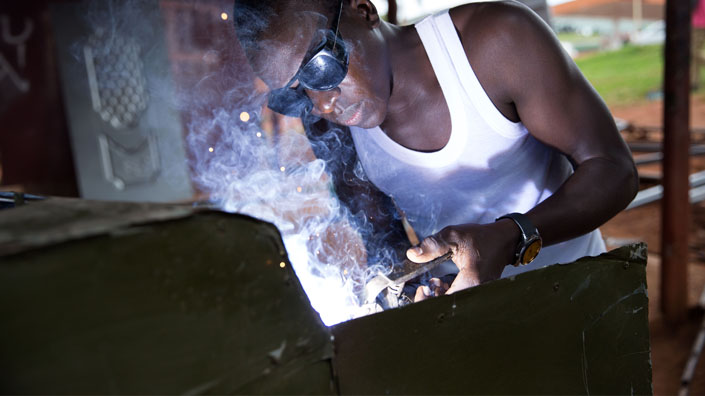 Lawrence Okettayot used to see people in his community in Uganda going hungry, as food from their sparse harvests went off before they could eat it. In fact, 45% of produce in the country is lost after harvest due to poor preservation and storage.
Lawrence Okettayot used to see people in his community in Uganda going hungry, as food from their sparse harvests went off before they could eat it. In fact, 45% of produce in the country is lost after harvest due to poor preservation and storage.
“I realised that dehydrating food quickly and cheaply would increase food security and income for many people,” he said. At the moment, many use open sun drying, which is slow and can be unhygienic. Okettayot created Sparky Dryer, which can remove moisture from food 10 times faster than sun drying, and five times faster than electric dryers.
The device, which looks like a filing cabinet, can dry 100kg of produce in just five hours, using only 2kg of biofuel. It’s claimed it can reduce the proportion of food lost to below 20%, and costs just a third of the price of an electric dryer.
Content published by Professional Engineering does not necessarily represent the views of the Institution of Mechanical Engineers.